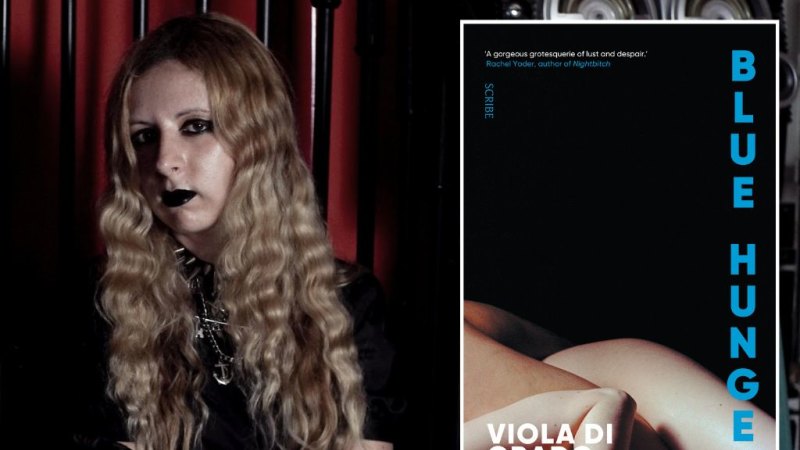
‘Dizzying fever dream’: The final scene of this sex-charged novel is spectacular
03/18/2023Remember a time when sex and love were inseparable? When a lover’s flesh was as vital as oxygen, their absence as unbearable as suffocation?
In Jamie Richards’ translation of Viola Di Grado’s Blue Hunger, a young woman embarks on a feverish love affair with an illusive yet capricious vagabond in Shanghai.
The final scene in Viola Di Grado’s novel is both unexpected, and exquisitely tender. Credit:
She has left her home in Rome to find a bigger city in which to grieve. Her twin brother, Ruben, has recently died. She takes his name in this new city, traversing its “complex, vitreous beauty”. In this tentacular urban metropolis, she finds ecstasy in the form of loving Xu.
At first, she can’t quite pronounce her lover’s name. She repeats it like a religious incantation. The love is unrequited, yet Ruben is determined to exercise her obsession, insisting on disappearing herself to dampen her grief.
Blue Hunger by Viola Di Grado.
Their love-making is violent. She begs Xu to bite her, to draw blood. “My body is brainless pulp. Eat me: make me yours, make me disappear.”
Di Grado’s emotional register mimics Garth Greenwell’s gorgeous study of sex and shame in What Belongs to You and Cleanness, in which queer bodies traverse public and private spaces. Here, our protagonist is also a teacher, a westerner immersing themselves in another culture. Both protagonists find solace by teaching language: in Greenwell’s case, English to Bulgarian students, in Di Grado’s case, Italian to Chinese students.
Xu is domineering and mean, deliberately opaque in her mannerism and communication. She sets the terms of the relationship, deciding when they meet, and what language they text in. Their language is porous and borderless — they toggle between Italian, Chinese and English.
Like Greenwell’s characters, Ruben and Xu have sex in public places, turning abandoned slaughterhouses and cinemas into locations of transgression. Amidst the carnal lasciviousness, there is tenderness too; they discover the city together, studying the architecture of buildings in scenes that reminded me of Kogonada’s 2017 soft-spoken masterpiece Columbus.
Di Grado imbues the corporeal mechanics of sex alongside sex as a form of “language-replacement”, something that supersedes verbal speech, creating a masterful narrative that conveys the ecstasy of new love: “It’s as if something inside me that had been fidgeting for so long had finally settled,” Ruben says.
‘I saw their hunger as a form of love. I saw every invasion as a form of love.’
Bodily invasions make her feel loved. Early in the novel, Ruben describes how as a little girl during summer, she would open the windows, turn on all the lights and outstretch her arms and legs for mosquitoes to eat her alive. “I saw their hunger as a form of love,” she boasts. “I saw every invasion as a form of love.”
Recent novels by young female authors offer us new ways of imaging the female body that allows female characters to reinvent sex on their own terms, as in Raven Leilani’s Luster, or use sex as a way to discover metaphysical truths about themselves, as in Sarah Thankam Mathews’ All This Could Be Different.
Like the heroines in both novels, Ruben is painfully aware of what she’s doing. “She was going to destroy me,” she admits of her lover. “I didn’t care if Xu’s mind was a racer that might suddenly skid into a ditch. I didn’t care if she was out of her mind, out of control. I wanted to be the bumpy asphalt that it skidded on.”
Blue Hunger is a breezy yet dizzying fever-dream of a read. The narrator’s voice is deceptively quiet. The book feels like it has a flame lighting it from underneath. It moves with a steady, compact agility, like a ship gesturing towards a mid-sea battle.
In this case, the battle is the narrative’s main crisis point: will Ruben stay and continue to be emotionally eviscerated by Xu? Or will she imagine another life for herself by severing the organic connections she felt towards Xu and the city? The final scene is a spectacular feat, managing to be both unexpected, and exquisitely tender.
Blue Hunger by Viola Di Grado (trans., Jamie Richards) is published by Scribe, $27.99.
The Booklist is a weekly newsletter for book lovers from books editor Jason Steger. Get it delivered every Friday.
Most Viewed in Culture
From our partners
Source: Read Full Article



